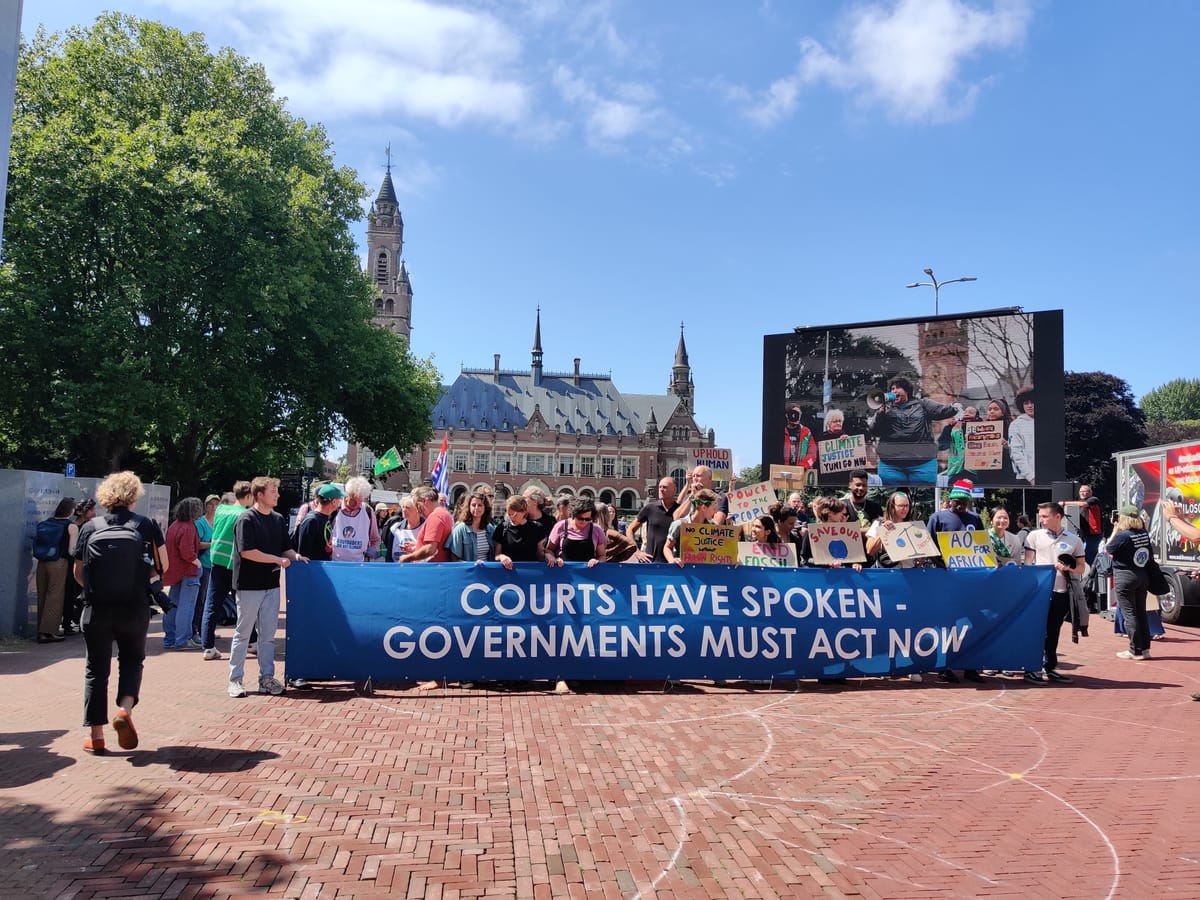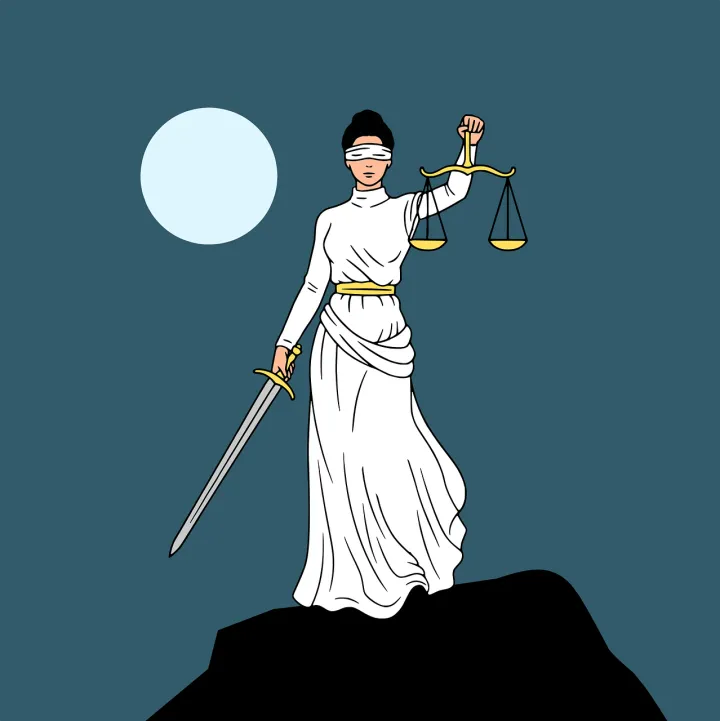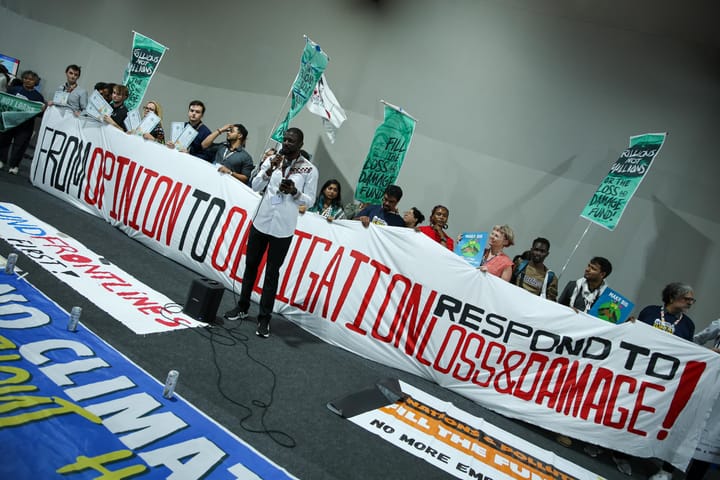‘A shot in the arm for climate litigation’: 13 things we learned from the ICJ’s advisory opinion on climate change

The International Court of Justice (ICJ) published its long-awaited advisory opinion on climate change yesterday.
It follows in the judicial footsteps of the Inter-American Court of Human Rights (IACHR) which concluded earlier this month that there is a human right to a healthy climate and the International Tribunal for the Law of the Sea which said states have a legal responsibility to control greenhouse gases. The African Court on Human and People’s Rights recently started its own proceedings.
Ralph Regenvanu, Vanuatu’s climate change minister, said the 133-page document provides a “critical foundation for lawyers and activists”. I wrote a news article for the Guardian (and a BBC feature explaining the background) about it, but there’s loads more to say so here are 13 things we now know:
- 1.5°c is a legally binding limit: In the 2015 Paris Agreement, states agreed to keep average global temperature rise to “well below” 2°c while “pursuing means” to limit the increase to 1.5°C. But the court said that subsequent statements and agreements by states, as well as the best available science embodied in the reports of the Intergovernmental Panel on Climate Change (IPCC), have made the tougher target the real deal.
“Climate science is at the heart of climate law, and the compass for climate justice” - Ralph Regenvanu, Vanuatu
- The climate change treaties have real legal consequences: Although not all aspects of the UN Framework Convention on Climate Change (UNFCCC) and the 2015 Paris Agreement are legally binding, the court says many are. And states only have “limited” discretion in preparing their nationally determined contributions (NDCs) within their respective means and capabilities. Not only that, but all climate plans taken together must be able to realise the Paris Agreement’s aim - ie to stay within the 1.5°c limit. Another thing: the legally binding Kyoto Protocol is still active and states have to continue to comply with it.
The ICJ's ruling is a powerful signal that the law is on our side. It must now guide not only courtrooms, but climate negotiations and policy decisions worldwide” - Cynthia Houniuhi, Pacific Islands Students Fighting Climate Change
- But state obligations are not limited to them: The world’s top greenhouse gas emitters denied they had any obligations beyond the UNFCCC and Paris Agreement. The court resoundingly rejects this claim, saying a range of other treaties apply including the UN Convention on the Law of the Sea, the Vienna Convention for the Protection of Ozone Layer, Montreal Protocol, Convention on Biological Diversity, and UN Convention to Combat Desertification. Customary international law also applies, it says, including principles of sustainable development, common but differentiated responsibilities, equity and intergenerational equity, as well as the precautionary principle. (A previous version of this article erroneously said it included the polluter pays principle, which is actually explicitly excluded but not resoundingly rejected.)
“In affirming that those calling to phase out fossil fuels and make polluters pay have the law on their side, the ICJ ruling is a springboard for ambitious climate action and effective climate accountability” - Nikki Reisch, Center for International Environmental Law
- Future generations must be taken into account: States have to take due regard of the interests of future generations and the long-term implications of their actions when making climate policies, says the court. Although there were different views about the precise concept of intergenerational equity, “its relevance for the obligations in respect of climate change is undisputable”.
“This advisory opinion is everything I hoped for, and I am so happy with this outcome as I know it will pave the way for a safer future for youth like myself and future generations, too” - Climate activist Vepaiamele Trief
- Climate change affects human rights: The court says a clean, healthy and sustainable environment is a precondition for the enjoyment of many human rights, such as the right to life, health and adequate standard of living, including access to water, food and housing. This is an affirmation of the UN General Assembly’s statement in 2022, which has proved difficult to crystallise into tangible law. And people cannot fully enjoy their human rights without the protection of the climate system, echoing the IACHR.
“The ruling reaffirms that climate justice and a just transition from fossil fuels are inseparable from human rights” - Gaëlle Dusepulchre, International Federation for Human Rights
- Countries must work together: States have a duty to cooperate to protect the environment, says the court, because uncoordinated action “may not lead to a meaningful result”. Among other things, that includes technical cooperation, knowledge-sharing and financial assistance, echoing ITLOS. And it definitely means helping more vulnerable countries adapt to the changing climate.
“The court reaffirmed that states have a customary legal obligation to cooperate in addressing climate change. Voluntary action is not enough. Climate justice demands coordinated, sustained and legally mandated cooperation across borders” - Alliance of Small Island States
- Fossil fuels cannot be swept under the rug: The court says a state’s failure to take appropriate action to protect the climate system from greenhouse gas emissions, including through the production and consumption of fossil fuels, the granting of fossil fuel exploration licences or the provision of fossil fuel subsidies, “may constitute an international wrongful act which is attributable to that state”.
“The message of the court is clear: the production, consumption and granting of licenses and subsidies for fossil fuels could be breaches of international law. Polluters must stop emitting and must pay for the harms they have caused” - Danilo Garrido, Greenpeace International
- The litigation door is wide open: States that have been harmed by the climate crisis can theoretically bring claims against those that caused it. It may be more difficult to make a causal link than in the case of local pollution, says the court, but it is not impossible and would be strengthened by existing science.
Courts could order reparations, including the restoration of infrastructure and ecosystems as well as an immediate stop to the illegal acts. In cases where the damage is irreparable, compensation may be due. And although the court recognises that some states - particularly small island developing states - are more likely to experience climate harm, these laws apply the same everywhere.
Lawyers involved in legal cases are already assessing how this strengthens their claims, and considering how future ones could be shaped around it (could Australia be targeted first?).
“The legal risks will now increase significantly in every country in the event of continued climate inaction” - Jérémie Suissa, Notre Affaire à Tous
“It’s a shot in the arm for climate litigation” - Ashfaq Khalfan, Oxfam America
- The US doesn’t have a get-out-of-jail-free pass: The ICJ takes aim at countries that are not part of the climate change treaties, saying they still have to show that their climate policies and practices are consistent with other parts of international law. Earlier this year, US president Donald Trump signed an order to withdraw his nation from the Paris Agreement for the second time - and other right-wing leaders have threatened to do so as well.
“The world court’s stunning opinion could be a major watershed for climate law and climate justice in the US and worldwide. The US is chief among climate offenders, especially with Trump at the helm. This ruling should bolster the case for climate action in courts of law and the halls of climate diplomacy” - Jean Su, Center for Biological Diversity
- Fast-growing states can’t shirk their responsibilities either: Under the UNFCCC, developed and developing countries have different duties. While states often talk about the principles of “common but differentiated responsibilities and respective capabilities”, the court notes that this is formulated differently in the Paris Agreement as "in the light of different national circumstances” and says this means the status of a state as developed or developing “is not static”. This is a nod to countries like China and India which have continued to maintain that they are developing states with fewer obligations despite hugely rapidly rising emissions.
“The world’s highest court has affirmed what millions of people all over the world have said time and time again: climate change threatens our very survival - and high-emitting states can and must be held accountable for the damage they’ve done” - Lea Main-Klingst, ClientEarth
- Rising seas doesn’t mean nations cease to exist: The court concluded that nations should maintain their statehood and maritime boundaries even if their land disappears underwater, echoing a recent report on sea-level rise by the International Law Commission.
“We can feel so helpless as we lose our homes, our livelihoods, and our safety to terrifying storms and rising seas. This historic legal decision from the ICJ gives us hope that communities, especially women and girls on the frontlines of this crisis, will finally be able to fight back for justice and accountability” - Flora Vano, ActionAid Vanuatu
- Countries may have to accept climate refugees: People who have to seek safety in another country due to climate change cannot be sent back if there are good grounds for believing that there is a real risk of irreparable harm to their right to lif, says the court. This was a point raised in submissions by the Solomon Islands.
“I was proud to be representing Solomon Islands in court today, in the largest ICJ case in history. It was big surprise to see the court adopt almost all of the arguments we made — in particular, that the human rights principle of non-refoulement applies to people displaced across borders due to climate change” - Harj Narulla, Doughty Street Chambers
- Law has limits: The ICJ’s advisory opinion surprised even its most passionate advocates with its strength and depth. And some of the judges had wanted to go further; judge Sarah Cleveland for example stresses the destructive impacts of armed conflict in her own declaration. But even the court was keen to stress that international law has an “important but ultimately limited role” in resolving the problem.
“A complete solution to this daunting, and self-inflicted, problem requires the contribution of all fields of human knowledge, whether law, science, economics or any other” - International Court of Justice



